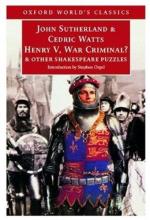|
This section contains 14,425 words (approx. 49 pages at 300 words per page) |

|
SOURCE: Corum, Richard. “Henry's Desires.” In Premodern Sexualities, edited by Louise Fradenburg and Carla Freccero, pp. 71-97. New York: Routledge, 1996.
In the following essay, Corum offers a “homosocial” reading of Henry's character in Henry V, analyzing phallic desire as a motivating force in the play.
… not the physical past whose existence is abolished, nor the epic past as it has become perfected in the work of memory, nor the historic past in which man finds the guarantor of his future, but the past which reveals itself reversed in repetition.
—Jacques Lacan
Let me begin with a brief account of the materials on one's desk when one sits down to work on Shakespeare's The Life of King Henry the Fifth. First, the figure Henry. Too visible after the fact, and altogether unrecoverable as a fact, Henry, “like himself,” is by 1415 already a legendary figure inherently vulnerable and inescapably defensive...
|
This section contains 14,425 words (approx. 49 pages at 300 words per page) |

|


